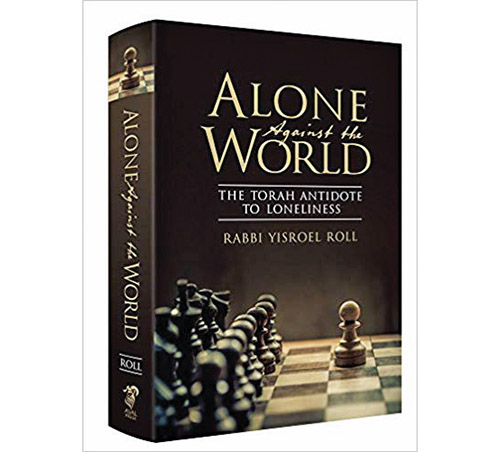
Reviewing: “Alone Against the World,” by Rabbi Yisroel Roll. Feldheim Publishers 2017. English. Hardcover. 400 pages. ISBN-13: 978-1680250671.
We have all felt lonely at one time or another. It’s human nature. The subtitle of this book, “The Torah antidote to loneliness,” introduces readers to the possibility that there is, in fact, a Torah-ordained, achievable way out of feeling alone. The book discusses loneliness versus aloneness.
The author explains that loneliness is feeling disconnected from yourself and others, often leading to a loss of self-esteem. You can even feel lonely in a room full of people. The flip side of loneliness is aloneness. When something bad happens, you can give in to the negative, to loneliness, or you can choose the positive, aloneness, and come to know your deeper self. It’s all about how you interpret events. The author asserts that aloneness forces you to reflect and examine your deepest thoughts and fears. When you are alone, your true self emerges. These are your true desires, your essence. Being alone aligns you with Hashem’s will because there is no inner turmoil or confusion to block it. You learn what you are about and gain self-acceptance, which allows you to let go of your need for outside approval because you have found your independent identity. Since you were created with a personal mission by Hashem Himself, you know He approves of you and you need no other acceptance. You are alone in this mission because it is uniquely yours.
The author goes on to say that aloneness is about individuality, independence and oneness. Just like Hashem is one and alone, singular, so is man who was created in His image. Man is unique like Hashem is unique. You have your own singular set of experiences, life circumstances and strengths. You won’t feel alone in a challenge if you realize Hashem equipped you with the proper strengths to handle it. As Tanna D’vei Eliyahu Rabba Chapter 25 states, “Every man in Israel must say ‘the world was created for me.’” If you are feeling down due to your loneliness, working on yourself and your mission will rid you of that feeling.
The author explains that aloneness is important because it creates a feeling of yearning for Hashem within you. Challenge creates connection. It also brings out dormant abilities you didn’t know you had. A difficulty brings out the spiritual strengths within you. One meaning of the word kedushah is separateness, because aloneness leads to holiness. Solitary Torah study can lead you to the introspection necessary to know Hashem and figure out your Divine mission.
The book is split into five parts. “Dimensions of Aloneness” is about the aspects of Hashem and man’s uniqueness. This section is about how loneliness can become aloneness. “The Avot” brings specific examples of times when men in Tanach were alone. For instance, Avraham Avinu was alone in believing in monotheism. “The Imahot” brings specific examples of when women in Tanach were alone. For instance, Esther was alone in the king’s palace and her mission to save the Jewish people. “Aloneness in Tefillah” is about the self-reflection and dveykut, connection, achieved through personal prayer. “Aloneness in the Talmud” is about various mentions of the uniqueness and singularity of man in the Gemara.
Reading about the challenges of David Hamelech and how he overcame adversity and isolation to write praise to Hashem was inspiring. He started as a lonely shepherd and ended as a leader of men and champion of Hashem. He went from rejected youngest son to founder of a dynasty and ancestor of Mashiach. May David Hamelech’s journey help us all discover our life’s mission and find aloneness with Hashem.
By Dassie Okin
Dassie Okin is from West Orange. She is a rising junior at Stern College and was a summer intern at The Jewish Link.











